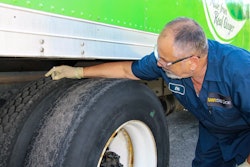I recently submitted comments on the Federal Motor Carrier Safety Administration’s Notice of Intent (NOI) to file an advance notice of supplemental proposed rulemaking on speed limiters countering the FMCSA’s premise that a speed limiter rule is neither necessary nor desired.
You can read my comments here.
Through its NOI, the regulatory agency seeks answers to questions that suggest it is pursuing a pre-conceived, antiquated 1950s solution to a 2020s' problem. It is clear from the NOI that the FMCSA seeks to apply statically set speed limiters by programming the truck’s electronic engine control unit. That in and of itself suggests that the very agency tasked with regulating the trucking industry knows little about the technology available in today’s trucks.
First, I believe that the implementation of a speed limiter final rule will have deleterious effects and will cause more accidents and damage to the economy.
In my comments, I proposed several modern, readily available technological solutions to the implementation of speed limiters that will better satisfy the objective of a speed limiter rule while also enhancing safety in a geographically diverse, dynamic environment that make a direct response to the questions posed by the FMCSA’s NOI irrelevant.
We need better speed enforcement across the board without creating a safety hazard.
The apparent lack of state and local speed enforcement, for whatever reason, is insufficient grounds to force the entire industry to bend to a speed limiter regulation that fails to justify the cost burden placed upon the industry as a whole, especially a one-size-fits-all approach that ignores the vast diversity of the nation’s geography, population and traffic patterns. If speeding is the problem that needs fixing, then speed limiters on trucks alone is a misapplication of law enforcement policy and strategy.
As both an industry advocate and million-mile professional driver, I believe the proposed speed limiter rule is secondary to the two actual root causes of truck speeding in the first place.
The first root cause is the Motor Carrier Exemption to the Fair Labor Standards Act (FLSA) that exempts trucking companies from paying overtime pay to its interstate drivers while they routinely work 70-plus hours per week. Similar to the speed limiter proposal, it is long past time to update the FLSA to reflect the modern-day reality of the technological gains since its passage by repealing the overtime exemption in its entirety.
If Congress acts on the FMCSA’s recommendation (based on highway safety) and the Department of Labor’s recommendation (based on pay plan equality honoring President Roosevelt’s FLSA goal to create “a floor under wages” and “a ceiling over hours”), then Congress can and should curb or eliminate unfavorable trucking labor conditions. With the passage of time that brought technological advancements, the conditions precedent to the 84-year old exemption have all disappeared, making the exemption’s continued existence not only unnecessary, but also a compounding factor in the supply chain bottleneck that contributes to an economic and national security vulnerability.
Since the FLSA’s 1938 enactment, the Motor Carrier Exemption has deprived $4.8 trillion in today's dollars from hardworking drivers' earnings, denying each interstate truck driver an annual average of $38,100 – $95 billion combined industry wide in 2022 dollars. Removing the exemption could inject that into the economy at a grassroots level that would broadly boost the economy. While Congress originally passed the FLSA with the aim of improving workers’ purchasing power, the exemption’s unintended consequences are now the very source of the ills that Congress intended the FLSA to cure.
The second root cause is the archaic pay-by-mile paradigm where carriers pay their drivers only when the wheels are turning while regulated by hour. This dichotomy presents an intrinsic compromise between safety and earning a paycheck. Without some economic value attributed to drivers’ working but non-driving time, no number of piecemeal regulatory Band-Aids will sufficiently cover the wounds inflicted upon the trucking industry.
I propose seeking and implementing solutions that bring professional truck drivers to pay parity among non-executive labor markets with the result of eliminating the financial motivations to speed.
I am keenly interested in helping the agency develop a more comprehensive approach to the industry’s many challenges that will benefit the industry, its professional drivers, the public and the country. Unfortunately, the approach taken by FMCSA regarding speed limiters represents a major industry breakdown. Absent a comprehensive regulatory approach, the FMCSA will fail to see the highway for the potholes.
Alec Costerus is president of Colorado-based over-the-road long-haul trucking company Aerodyne Transportation, LLC, and is co-founder of Alpha Drivers Testing & Consulting, a consulting firm specializing in optimizing drivetrains for owner-operators and fleets. He is the immediate past-Chairman of the Trucking Solutions Group, a peer-to-peer group of owner-operators who collaborate on trucking business and regulatory matters. He can be reached at [email protected].












